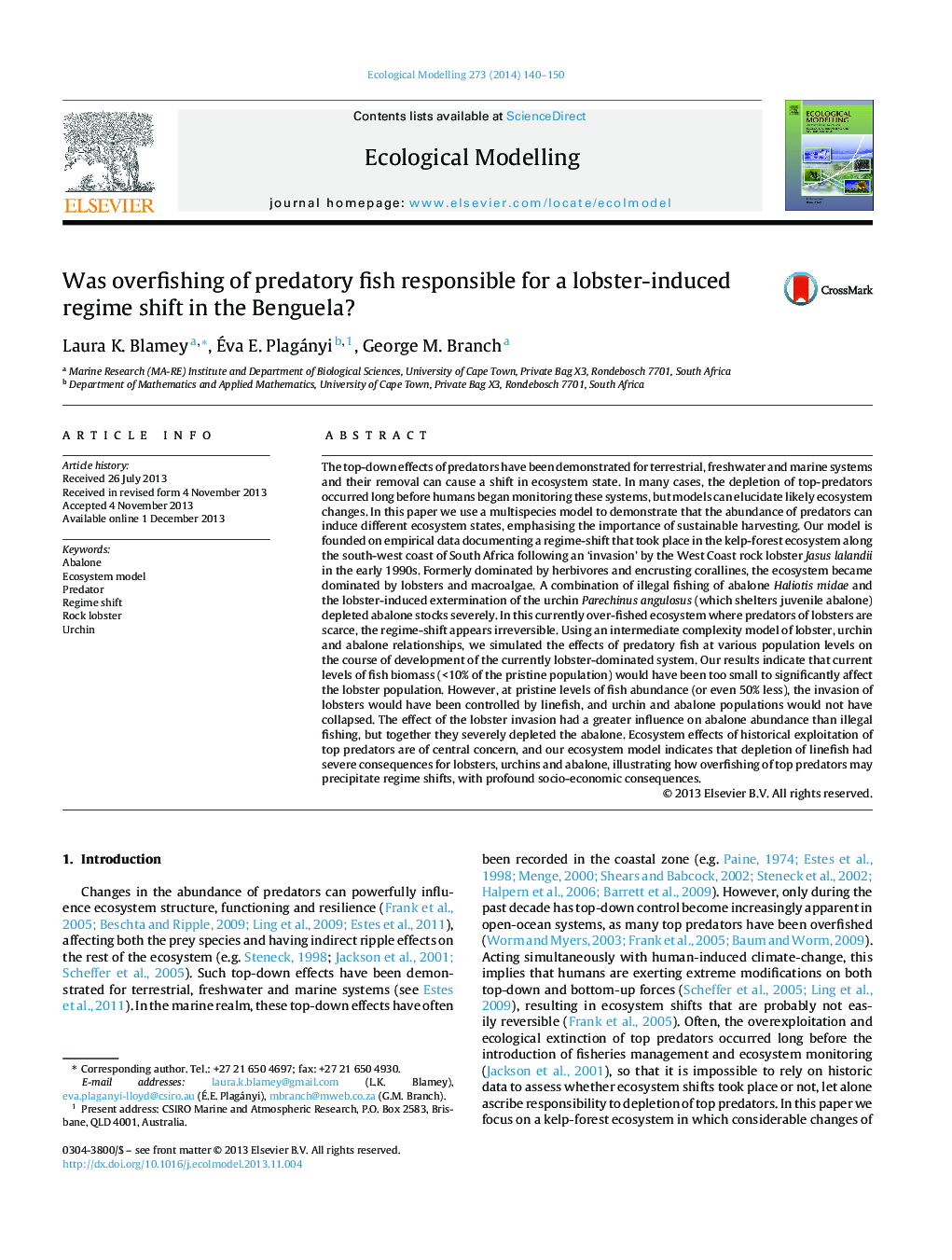| کد مقاله | کد نشریه | سال انتشار | مقاله انگلیسی | نسخه تمام متن |
|---|---|---|---|---|
| 6296927 | 1617473 | 2014 | 11 صفحه PDF | دانلود رایگان |
عنوان انگلیسی مقاله ISI
Was overfishing of predatory fish responsible for a lobster-induced regime shift in the Benguela?
دانلود مقاله + سفارش ترجمه
دانلود مقاله ISI انگلیسی
رایگان برای ایرانیان
کلمات کلیدی
موضوعات مرتبط
علوم زیستی و بیوفناوری
علوم کشاورزی و بیولوژیک
بوم شناسی، تکامل، رفتار و سامانه شناسی
پیش نمایش صفحه اول مقاله

چکیده انگلیسی
The top-down effects of predators have been demonstrated for terrestrial, freshwater and marine systems and their removal can cause a shift in ecosystem state. In many cases, the depletion of top-predators occurred long before humans began monitoring these systems, but models can elucidate likely ecosystem changes. In this paper we use a multispecies model to demonstrate that the abundance of predators can induce different ecosystem states, emphasising the importance of sustainable harvesting. Our model is founded on empirical data documenting a regime-shift that took place in the kelp-forest ecosystem along the south-west coast of South Africa following an 'invasion' by the West Coast rock lobster Jasus lalandii in the early 1990s. Formerly dominated by herbivores and encrusting corallines, the ecosystem became dominated by lobsters and macroalgae. A combination of illegal fishing of abalone Haliotis midae and the lobster-induced extermination of the urchin Parechinus angulosus (which shelters juvenile abalone) depleted abalone stocks severely. In this currently over-fished ecosystem where predators of lobsters are scarce, the regime-shift appears irreversible. Using an intermediate complexity model of lobster, urchin and abalone relationships, we simulated the effects of predatory fish at various population levels on the course of development of the currently lobster-dominated system. Our results indicate that current levels of fish biomass (<10% of the pristine population) would have been too small to significantly affect the lobster population. However, at pristine levels of fish abundance (or even 50% less), the invasion of lobsters would have been controlled by linefish, and urchin and abalone populations would not have collapsed. The effect of the lobster invasion had a greater influence on abalone abundance than illegal fishing, but together they severely depleted the abalone. Ecosystem effects of historical exploitation of top predators are of central concern, and our ecosystem model indicates that depletion of linefish had severe consequences for lobsters, urchins and abalone, illustrating how overfishing of top predators may precipitate regime shifts, with profound socio-economic consequences.
ناشر
Database: Elsevier - ScienceDirect (ساینس دایرکت)
Journal: Ecological Modelling - Volume 273, 10 February 2014, Pages 140-150
Journal: Ecological Modelling - Volume 273, 10 February 2014, Pages 140-150
نویسندگان
Laura K. Blamey, Ãva E. Plagányi, George M. Branch,